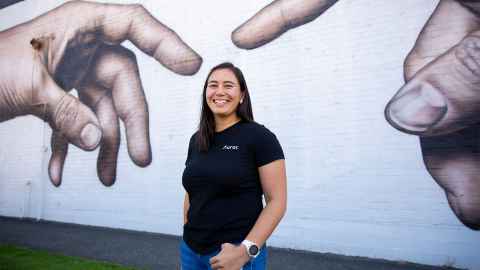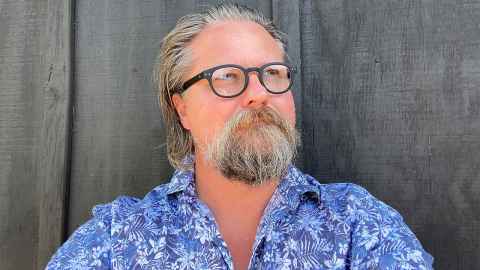Covid-19 upside: the Kiwi brain gain
23 May 2021
The consensus among Kiwis who have returned home because of Covid-19 is that they’re enjoying the opportunities. Danelle Clayton talks to four University of Auckland alumni about the upsides of living in New Zealand again.

What will keep people here is knowing others are staying too.
There are three universal truths on which our expats, returning home because of Covid-19, seem to agree.
The first is that there is an exciting air about working in New Zealand; that we could be on the verge of a vibrant new economic era. Second is the gripe about the traffic. And third is the cost of groceries. So, with push and pull factors at play, will they stay? And are we doing enough to keep them here?
With the second-largest overseas population per capita in the OECD (around one million), the homeward migration of Kiwis since the Covid-19 pandemic presents an extraordinary economic opportunity, even if only a small percentage change their plans and return home.
According to expat organisation Kea New Zealand, most returnees are highly skilled and come from senior positions in high-value sectors. Many are also part of the worldwide diaspora of University of Auckland alumni.
Statistics New Zealand says we are experiencing our first net gain of New Zealand citizens at the border since data collection began in the late 1970s. In the 12 months to January 2021, New Zealand gained 33,200 people, 20,800 of them New Zealand citizens.
Historically, New Zealand has had an annual net loss of Kiwis. Kea New Zealand says what’s notable is the return of highly skilled New Zealand citizens who would not have come back otherwise. In August 2020, Kea launched its ‘Welcome Home Survey’ of 15,000 expats, to better understand the migration intentions of its membership. The survey found 7 percent of respondents had already returned and 49 percent intended to return, 24 percent in the next 12 months and the remainder over the next four years – signalling a long-term trend. Nearly a third are returning with families (29 percent) and 10 percent are returning with pets.
The report’s analysis was supported by Distinguished Professor Sir Peter Gluckman of Koi Tū: The Centre for Informed Futures, who says that Covid-19 is having an undisputed impact on the volume and calibre of returnees.
“This includes a significant number in an age range and talent pool who were generally previously assumed unlikely to return at the height of their game. The question is whether this opportunity may need to be encouraged and what barriers need to be removed,” Peter says.
Kylene Jones (BCom, Accounting and Marketing, 2013) believes we are seeing the beginning of a new wave of entrepreneurs coming through in New Zealand.
“People are taking a punt. Quite a few friends have started their own businesses here in the midst of Covid,” she says.
Kylene, 29, was on the rise in the start-up space in London as the senior general manager at Deliveroo, a food-delivery business, when Covid-19 forced her to change tack.
“When Covid kicked off, we made tracks to Australia for a wedding and to watch what was happening in the UK from afar. The wedding was cancelled, our stay was extended to six months and we were in lockdown in Melbourne. It was tough working UK hours. We found ourselves in limbo.”
Seeing the freedom across the ditch made it an easy decision for Kylene to move back home.
She left her job, her partner deferred his MBA at Oxford, and they returned to Auckland.
To her surprise, Kylene found a buoyant start-up market and landed a job with Auror, a homegrown crime intelligence platform with a global focus.
“The role I was looking for wasn’t advertised, but most of the start-ups I contacted were willing to create something for me.
“My partner got a great job, too, and we’ve even bought a house.”
Despite putting down roots, Kylene hasn’t yet finished with her travels, but this time would like to take a New Zealand company international.
“I love being close to family and reconnecting with old friends. But it can be hard to feel globally connected here.
“Kiwis are very non-confrontational and I don’t think we ask the hard questions enough. What will keep people here is knowing that others are staying, too.
“We realise New Zealand has a really good work-life balance and you can have an exciting career here, too.”

If they have the skills to go to the other side of the world, start from scratch and become a success, they can do the same in their own backyard.
Jon Vollemaere (BCom, Finance & Commercial Law, 1993) is a successful entrepreneur in the field of financial technology. He is the Founder and CEO of R5, an international marketplace centred on emerging currencies. Based in New York City and London for around 30 years, Jon made a snap decision to return home temporarily with his wife and young daughter in March 2020.
“We were going to come home for two to three months until Covid blew over. We packed five bags and jumped on a plane three days later.
“When we arrived in Auckland it was in lockdown so we isolated at a friend’s bach on Waiheke Island and haven’t left.
“Now we work from home, mainly UK hours. Zoom allows your team to be internationally dispersed, our daughter plays on the beach almost every day, and luckily for us there’s no traffic on the island.”
Jon believes returnees could set in motion an economic snowball effect.
“But if the environment for that to happen is not addressed, then a decent proportion may well boomerang once the smoke clears.
“We have seen reports on ‘the productivity problem’, which is partly due to a lack of international skills and experience within most New Zealand firms,” Jon says. “I hear time and time again about highly skilled returning Kiwis failing to get jobs because of their lack of a local network, or projects being too small, or that they’re overqualified, but that is rubbish.
“I’ve hired plenty of overqualified people and those who are far smarter than me.”
Jon encourages Kiwi employers to seize the opportunity to hire returning talent and also hopes some expats might start their own New Zealand-based ventures.
“If they have the skills, drive, knowledge and self-belief to go to the other side of the world, start from scratch and become a success, sometimes in another language, those people can do the same in their own backyard.”

The technology industry in New Zealand has grown massively since I left five years ago.
“My industry, the technology sector, has grown massively since I left five years ago,” says Lucy Luo (BCom Finance, LLB Hons, 2012).
“There’s more venture funding around for start-ups than there used to be, and they are increasingly led by experienced founders or executives rather than first-timers. It’s a great time to be working in tech in New Zealand.”
Lucy’s working OE in Singapore and Amsterdam meant exposure to greater-scale and more-mature tech ecosystems than in New Zealand, as well as lots of travel.
Now she is back in Auckland as the chief of staff at First AML, which provides software to help companies comply with anti-money- laundering regulations.
“Having seen the Covid-19 numbers spike across Europe, I decided to leave. I felt very grateful at how our government here took care of its citizens during the pandemic.”
In her new role, she says there is something magical about working with a bunch of awesome individuals taking a Kiwi company global.
“While the tech sector is booming, unfortunately Māori and Pacific people are quite under-represented. It would be good to create more supportive pathways for people of all backgrounds to be involved in, and benefit from, the success of New Zealand’s tech sector.”

The past year or so has shown many of us how important it is to be adaptable and resilient in the face of uncertainty.
Tao Lin (Conjoint BA/LLB, 2011) has continued to work remotely for her Japanese employer since she came home from Tokyo in May 2020.
With Japanese salaries generally lower than in New Zealand, she has found the high cost of living in Auckland a “manageable struggle”.
“After New Zealand reported its first case of Covid, things escalated rapidly. I got one of the last direct Air New Zealand flights home, leaving me one week to pack up my life,” she says.
“The past year has been difficult for a lot of people. It’s sad that young Kiwis are missing out on international travel, as you learn so much from different cultures and grow as a result. But we should remember it’s an immense privilege that not everyone can afford to experience.”
Since returning, Tao has launched the Not Your Token Minority podcast, a series for often- overlooked minorities to tell their personal stories and experiences.
“I’ve spoken to a few people for my podcast who returned to New Zealand because of Covid and I follow others on my social media.
“The common experience is, while it can be frustrating having your life overseas disrupted or cut short, everyone is grateful to be in a country where the government acts fast and in the interests of its people.
“The past year or so has shown many of us how important it is to be adaptable and resilient in the face of uncertainty.”
This story first appeared in Ingenio magazine, the alumni publication of the University of Auckland.
Get in touch
Have you returned home from overseas because of Covid-19? Share your story with: ingenio@auckland.ac.nz